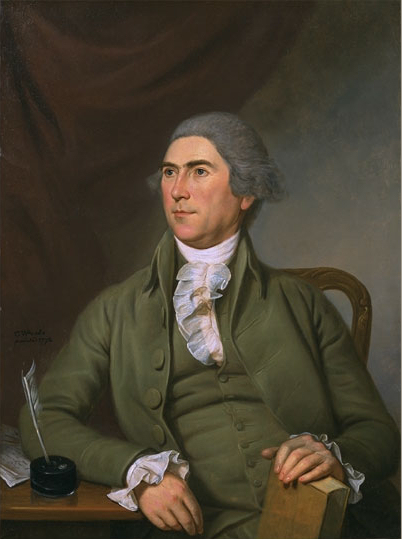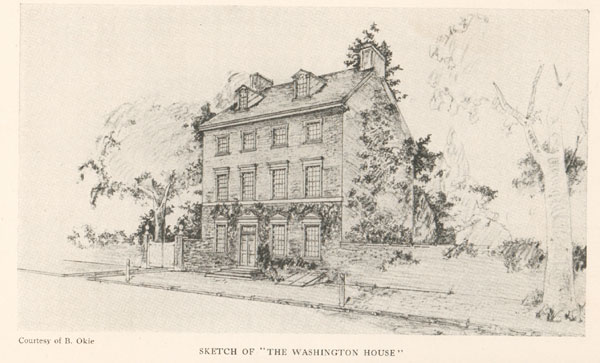| Thomas Lindberg | 
Governor Thomas Lindberg, ca 1784.
Age: 49 (b. 1740)
Spouse: Anna, née Eriksdotter (b. 1744)
Occupation: Governor of Pennsylvania
Skills:
+1 Espionage
+1 Wealth
+3 Charisma
Heritage
Other European-American: You don’t belong to any of the above categories, even though your ancestors were 1) definitely European and 2) established in America, sometimes coming with the earliest settlers in a given state. They may have been Spanish, Italian, German, Scandinavian or even from Eastern Europe and the Caucasus. In any case, they bring with them a diverse set of skills and experiences, though they are less likely (in some cases vastly so) to be accepted in positions of political power than the former three categories. +1 Espionage or Logistician.
Religion
Deist: You are a Deist. You believe in a vaguely defined Supreme Being which the Christians call God, but only as a creator: as far as you’re concerned, the First Cause does not interact with its creations at all and is content to let them operate as they will. Deists tend to be the most radical embracers of the Enlightenment and all the liberal ideologies it brings. Thomas Jefferson was an example of a historical American Deist.
Idolized Philosopher
Jean-Jacques Rousseau: In your younger years, the political philosopher you looked up to most was Jean-Jacques Rousseau. His belief that humans were fundamentally good and that direct democracy, whereby all are free even as they impose their will on each other because their own will was taken into account within the general collective, was the best sort of democracy rubbed off on you as a result, leaving you with radically liberal and populistic inclinations. +1 Charisma.
Early Life
Merchant: Prior to entering politics, you ran your own business as a merchant of at least local note. In this role you not only crunched numbers but also learned to buy low and sell high, to efficiently manage not only accounts but also your workers, to spot and plan for both opportunities and risks, and to deal with both competitors and tough customers - all skills that should serve you well in the realm of politics. +1 Wealth.
Role in the Revolution
Congressman: During the war, you were part of the Continental Congress. You did not fight in the field but instead politically represented the American states & people, presenting their demands to the British Crown at the Revolution’s eve and providing civilian leadership to revolutionary forces which foreign countries could negotiate with. As a delegate of the Congress, you also likely wrangled with overambitious generals from time to time, and may have even fought a duel or several over honor in clashes with prickly fellow Congressmen. +1 Wealth, Personal Combat or Charisma.
Role in the Confederation Period
Congressman: Whether a newcomer or already a member of the wartime Continental Congress, you became a member of the post-Revolutionary War Congress of the Confederation, the feeble and virtually powerless nominal legislature of the USA under the original Articles of Confederation. With no military, no means of acquiring revenue, and little credence in the eyes of foreign powers, you and the rest of this Congress may as well not have existed - but you and it did, and despite your overall powerlessness, you still learned valuable political lessons & forged connections with the other Congressmen while you were there. +1 Charisma or Espionage.
|
| Gustav Lindberg | 
Portrait of Gustav Lindberg, ca 1789.
Age: 26 (b. 1763)
Spouse: None
Occupation: Member of the United States House of Representatives from Pennsylvania
Skills:
+1 Personal Combat
+2 Espionage
+2 Charisma
Heritage
Other European-American: You don’t belong to any of the above categories, even though your ancestors were 1) definitely European and 2) established in America, sometimes coming with the earliest settlers in a given state. They may have been Spanish, Italian, German, Scandinavian or even from Eastern Europe and the Caucasus. In any case, they bring with them a diverse set of skills and experiences, though they are less likely (in some cases vastly so) to be accepted in positions of political power than the former three categories. +1 Espionage or Logistician.
Religion
Deist: You are a Deist. You believe in a vaguely defined Supreme Being which the Christians call God, but only as a creator: as far as you’re concerned, the First Cause does not interact with its creations at all and is content to let them operate as they will. Deists tend to be the most radical embracers of the Enlightenment and all the liberal ideologies it brings. Thomas Jefferson was an example of a historical American Deist.
Idolized Philosopher
Jean-Jacques Rousseau: In your younger years, the political philosopher you looked up to most was Jean-Jacques Rousseau. His belief that humans were fundamentally good and that direct democracy, whereby all are free even as they impose their will on each other because their own will was taken into account within the general collective, was the best sort of democracy rubbed off on you as a result, leaving you with radically liberal and populistic inclinations. +1 Charisma.
Early Life
Diplomat: In your younger years, you were a member of the diplomatic corps, and thus was enmeshed in politics quite early on. Prior to the outbreak of the Revolution, you may have already been working as an envoy for Britain; afterwards, you represented America in critical negotiations with the French, Spanish and Dutch, helping to bring these Great Powers into the fight against the British. +1 Charisma.
Role in the Revolution
Congressman: During the war, you were part of the Continental Congress. You did not fight in the field but instead politically represented the American states & people, presenting their demands to the British Crown at the Revolution’s eve and providing civilian leadership to revolutionary forces which foreign countries could negotiate with. As a delegate of the Congress, you also likely wrangled with overambitious generals from time to time, and may have even fought a duel or several over honor in clashes with prickly fellow Congressmen. +1 Wealth, Personal Combat or Charisma.
Role in the Confederation Period
Congressman: Whether a newcomer or already a member of the wartime Continental Congress, you became a member of the post-Revolutionary War Congress of the Confederation, the feeble and virtually powerless nominal legislature of the USA under the original Articles of Confederation. With no military, no means of acquiring revenue, and little credence in the eyes of foreign powers, you and the rest of this Congress may as well not have existed - but you and it did, and despite your overall powerlessness, you still learned valuable political lessons & forged connections with the other Congressmen while you were there. +1 Charisma or Espionage.
|
|








 Reply With Quote
Reply With Quote










